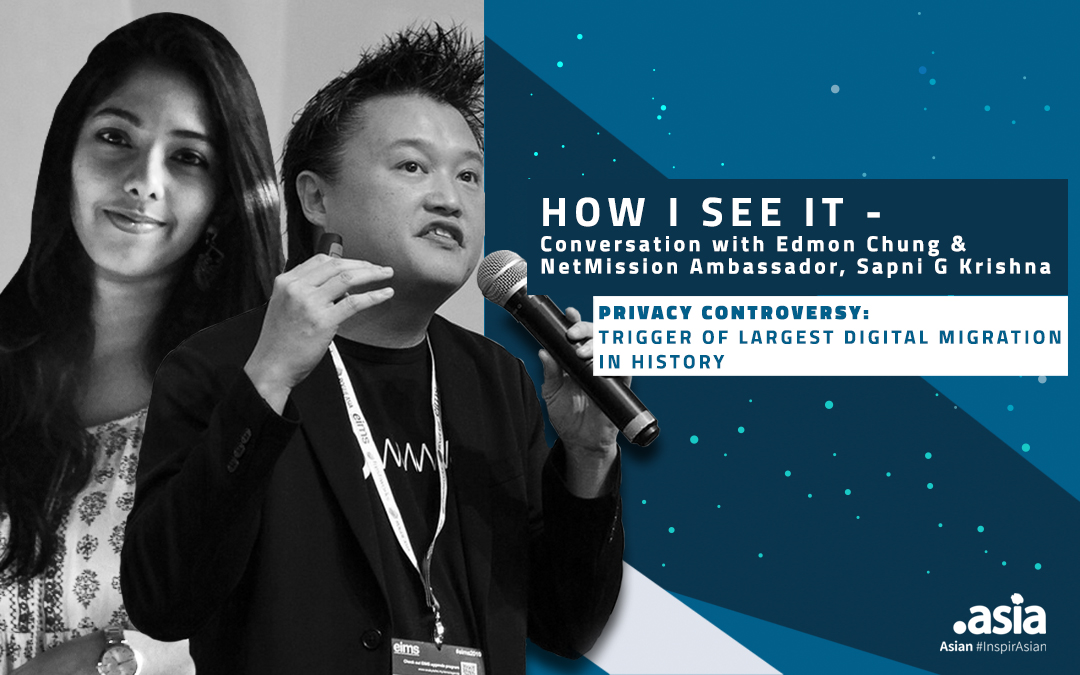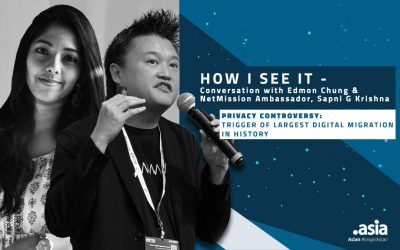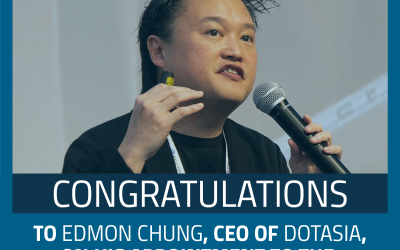Written by Sapni G Krishna (Edited and posted by Jenna Fung)
Technology giants, or Big Tech as they are called, have become intertwined extensively with our everyday lives. Early in 2021, Facebook decided to take a step ahead in monetising Whatsapp. This was to be enabled by the changes in the terms outlined in its updated privacy policy. One fine day, users woke up to the notification for the proposed changes in its Privacy Policy. This paved the way to an international conversation about privacy, and also triggered widespread adoption of alternatives to Whatsapp such as Signal and Telegram.
In this episode, Edmon Chung, the CEO of DotAsia Organisation, and Sapni G Krishna, NetMission ambassador — a law student from India who is passionate about regulation of the internet and emerging technologies — are going to explore the changing landscape of privacy in a technology mediated world.
“I believe that a new generation that respects online privacy is in the making, and we will see corporate culture change over time if the right policies are put in place“

Sapni:
Why does the commercial world always want our data?

Edmon:
The world is chanting the mantra of data as the new oil. This has led to a situation where the sector is focused on amassing data as the sole business model. But a bigger story about the Whatsapp case is the importance and benefits of having alternatives. Often, people don’t immediately realise the benefits of redundancies, and that being multihomed as a habit helps eliminate the overall dependence on few players and fosters competition. Convenience driven mentality supports monopoly, or de facto monopoly which has become the norm in various aspects of online life. There is an emerging concentration of traffic to the big tech networks, Reducing level of competition in the technology sector while every startup tries to find new ways to exploit and mine personal and behavioural data.

Sapni:
There is an overarching tendency to consider privacy as a lost cause in the digital world. How do we understand and reestablish norms of privacy for the benefit of the consumers?

Edmon:
Sometimes it is important to understand the motivations and interests behind research and reports that proclaim privacy dead. With digital encryption, in fact privacy can be well maintained, the question is whether popular platforms and systems embrace such end-to-end protection for users. A lot of times also, there is commercial interest to make sure that certain types of exploitative behaviour is academically termed useful. Exploiting the data of users becomes the economic model of progress, in this ecosystem. The attempt is to achieve ultimate marketing advantage not only by predicting, but also inducing behavioural changes. Therein lies a question of what is beneficial really for the consumer. Convenience only or are there more fundamental ethics that should be considered.

Sapni:
How are newer players who have disrupted the concentration of power with the major tech monopolies, such as Clubhouse, traversing privacy? How can we prevent them from harming the rights of the users?

Edmon:
All newer innovations and startups will have teething problems. Transparency is the key to drive change into this behaviour of being extractive of user data. If they care about their users and want to provide a platform for their users while making money off it, transparency is critical. While permissionless innovation should allow the disruption, a particular disruptive model cannot be assumed to be off limits to policies and regulation forever. Once you break into the game, you must be held to higher standards. Problem with privacy is not just the companies, but also the government. Governments also have interests in using the data which they force companies to provide them. Here the users are squeezed from both sides.

Sapni:
How do you think the Internet has fundamentally changed the notion of privacy and its enforcement in our society?

Edmon:
The Internet fundamentally changes the way we experience time and space. Instant interaction and collection of data on one hand, and on the other hand everything is recorded forever. This combined dynamic changes the equation against what we have traditionally presumed as the course of events. The ease and reducing cost of keeping data also contributes to this tendency of diminishing sense of privacy, and making it easy to do what is called dragnet surveillance or dragnet monitoring of data. That is, collection of all data indiscriminately and then figure out what can be deduced out of it afterwards. Additionally, privately owned public spaces online changes the concept of public spaces. Today on the internet, a lot of the “public spaces” are subject to private interests, which means the accountability and due process upholding human rights and freedom of expression is left to private companies, rather than elected governments.

Sapni:
Are there hurdles to enforcement because of the nature of undue influence these entities have? How can we counter that?

Edmon:

Sapni:
How can principles of right to privacy be implemented with maximum effect within Asia Pacific considering the learning from GDPR in the age of pandemic?

Edmon:

Sapni:
Privacy policies of communication and social media platforms are the basis on which we engage and share our data with companies. What do you think can be done to improve the efficacy and the legitimacy of privacy policies of various products?

Edmon:
Privacy policies and regulation are important, but technology is equally important. We need to understand that social media platforms, especially messaging platforms, are really intermediaries carrying a message from one user to another. More End to End Encryption technology needs to be put in place such that the platforms themselves do not even have access to the actual private data. But this can be implemented not just in messaging services, but for other services too. Also, it is important to provide the users with the key to decide if they continue to give a company their consent to use their private data. Furthermore, platforms should seek the consent from users for any additional use of their data. A good example of privacy preserving models is the Google-Apple contact tracing protocol, where the algorithm is sent to the device rather than having centralized data collection. People shouldn’t give up on the quest for privacy. Today, many companies are keeping more data than they need because it is easier. The technology can be put in place, to make privacy friendly models easier to implement, and other policies and mechanisms need to be put in place to increase the cost of keeping large amounts of private data.
We need to also guard against traditionally offline data from being absorbed into the same model, and the regulation of CCTVs provides an interesting example. CCTVs are supposed to be “closed circuit” TVs, yet many are no longer closed circuit, but web enabled. The video is supposed to be erased within a fixed period of time, but nowadays, they are uploaded, stored and backed-up. So regulations must look at the purpose and context better and be updated accordingly.

Sapni:
To what extent do we enjoy privacy inside a closed space and outside?

Edmon:
The law has a clear mandate on the idea of expectation of privacy, which comes into play in the physical world. For example if you are in the privacy of your home, you do not expect to be photographed from outside. In the virtual world, the same concept should apply, and intermediaries should not be able to pry into our private conversations. In addition to that, there is a need for an expectation of anonymity online. These are crucial in the case of privacy in the virtual world.

Sapni:
A lot of companies cite consent fatigue as a problem. How do we uphold privacy without giving in to consent fatigue?

Edmon:
While a lot of these studies are true, we must be cognizant that companies also deliberately do so to create consent fatigue, which supports their interests to resist privacy regulations. It is possible to have technology and design interfaces that would make configuring your consent much easier. Moreover, it is also important that users can easily withdraw consent, with granularity. I believe that a new generation that respects online privacy is in the making, and we will see corporate culture change over time if the right policies are put in place, but that requires our voicing and fighting for the rights to privacy both through advocacy and consumer movements.
This.Is.Asia Newsletter Issues
This.is.Asia December 2021 Issue
This.is.Asia October 2021 Issue
This.is.Asia October 2021 Issue
This.is.Asia August 2021 Issue
This.is.Asia August 2021 Issue
This.is.Asia June 2021 Issue
This.is.Asia April 2021 Issue
This.is.Asia February 2021 Issue
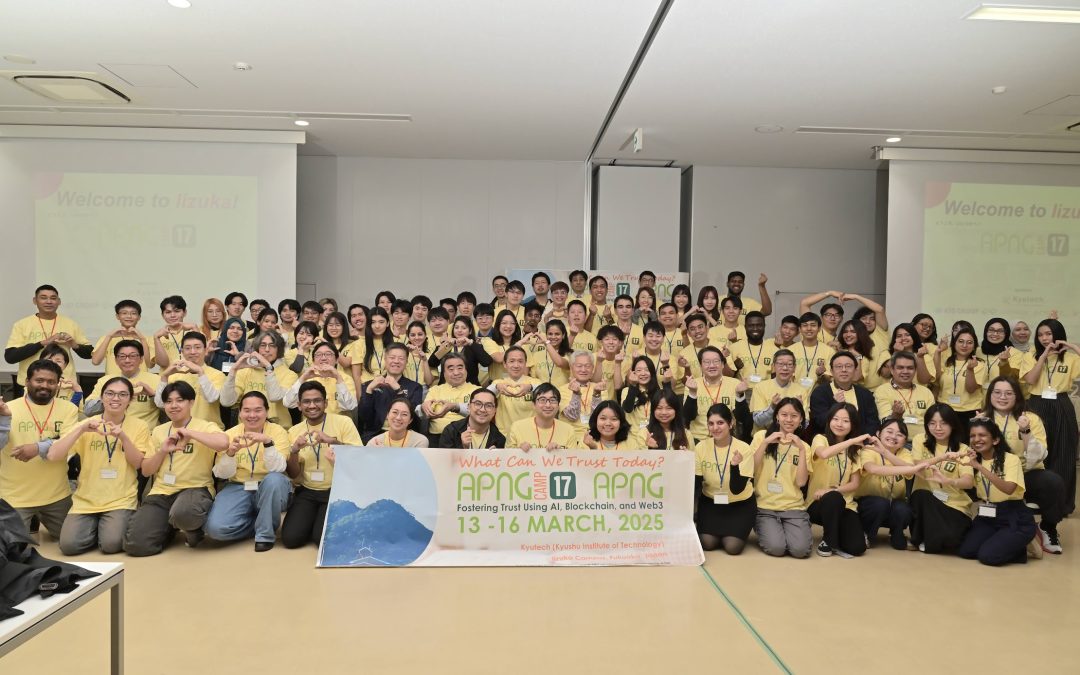
17th Asia Pacific Next Generation (APNG) Camp
The 17th APNG Camp successfully provided a collaborative space for young Internet leaders to explore critical topics related to trust in the digital age.
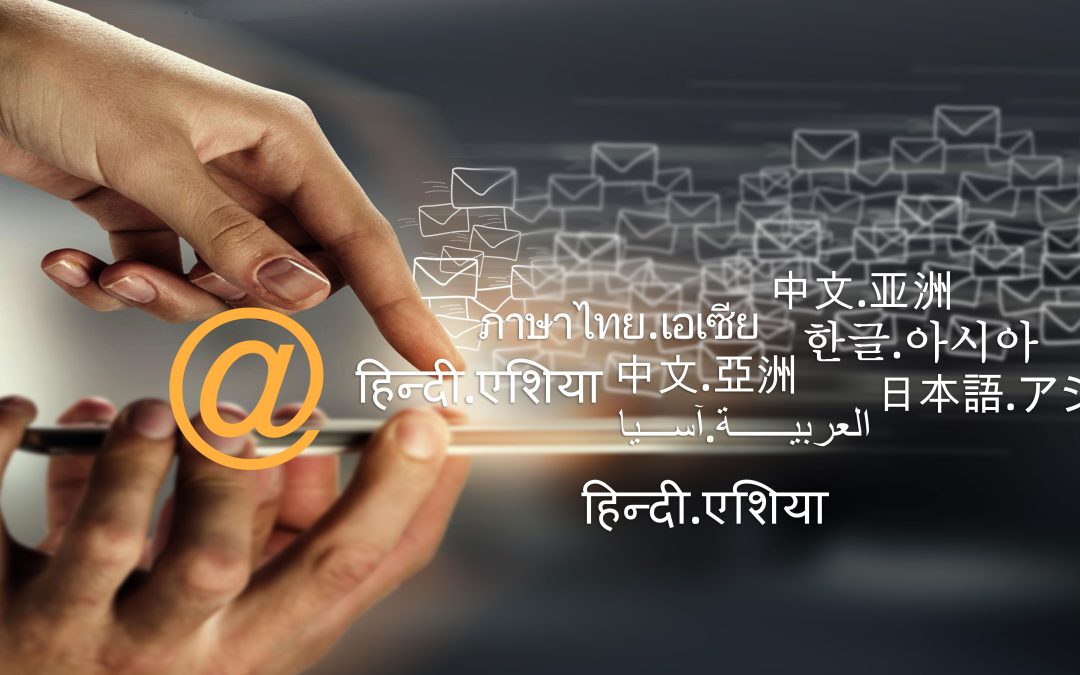
Beyond ASCII: The Vital Role of Email Address Internationalization in a Connected World
As the world becomes more connected, the need to use domain names and email addresses in local languages and scripts also continues to rise. EAI adoption has been growing in recent years, according to a Universal Acceptance Steering Group (UASG) report, as of May 2021, around 9.6% of email domains now support Email Address Internationalization (EAI), marking a noteworthy improvement from previous years. This progress indicates that EAI support is becoming more prevalent, ultimately making it simpler for individuals across the globe to utilize email addresses in their preferred languages and scripts
Continued Commitment to the Vision and Mission of DotAsia
An Open Letter and Call for Support Dear DotAsia Board and the Asia Pacific Internet Community, Thank you for the invitation for me to submit to you my ongoing commitment and vision for DotAsia to be a contributor to the regional and global Internet community as the...
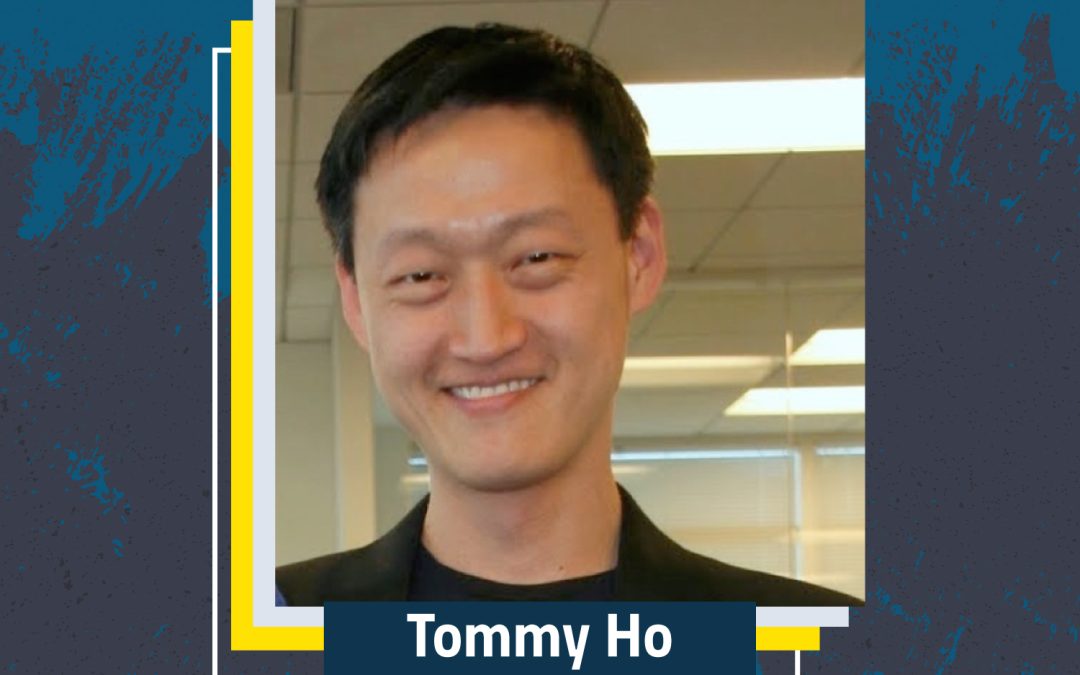
AAPI Heritage Month: Interview with Tommy Ho
Asian American heritage is about inclusion. It’s a description that cuts a wide cloth across a vast array of cultures and peoples, and it’s important to celebrate the similarities and differences. I see that diversity represented within GoDaddy’s Employee Resource Group (ERG), and GoDaddy Asians are growing. Especially during these unpredictable times, our sense of belonging that we feel through our groups help to boost mental and physical health.
